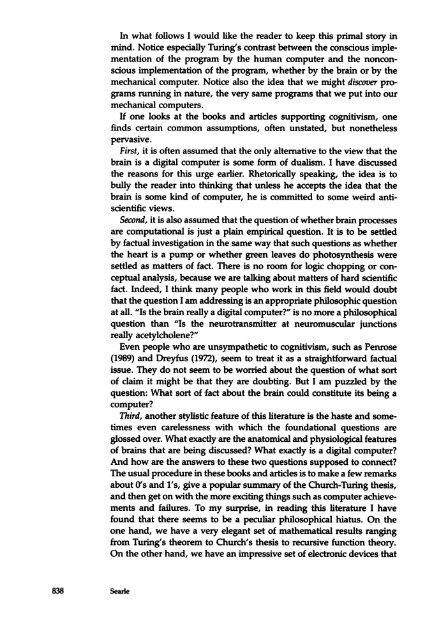John R. Searle - The Critique of Cognitive Reason
John R. Searle - The Critique of Cognitive Reason
John R. Searle - The Critique of Cognitive Reason
Create successful ePaper yourself
Turn your PDF publications into a flip-book with our unique Google optimized e-Paper software.
In what follows I would like the reader to keep this primal story inmind . Notice especially Turing' s contrast between the conscious implementation<strong>of</strong> the program by the human computer and the nonconsciousimplementation <strong>of</strong> the program , whether by the brain or by themechanical computer . Notice also the idea that we might discover programsrunning in nature , the very same programs that we put into ourmechanical computers .If one looks at the books and articles supporting cognitivism , onefinds certain common assumptions , <strong>of</strong>ten unstated, but nonethelesspervasive .First, it is <strong>of</strong>ten assumed that the only alternative to the view that thebrain is a digital computer is some form <strong>of</strong> dualism . I have discussedthe reasons for this urge earlier. Rhetorically speaking , the idea is tobully the reader into thinking that unless he accepts the idea that thebrain is some kind <strong>of</strong> computer , he is committed to some weird antiscientificviews .Second, it is also assumed that the question <strong>of</strong> whether brain process esare computational is just a plain empirical question . It is to be settledby factual investigation in the same way that such questions as whetherthe heart is a pump or whether green leaves do photosynthesis weresettled as matters <strong>of</strong> fact. <strong>The</strong>re is no room for logic chopping or con-ceptual analysis, because we are talking about matters <strong>of</strong> hard scientificfact. Indeed , I think many people who work in this field would doubtthat the question I am addressing is an appropriate philosophic questionat all . " Is the brain really a digital computer ? " is no more a philosophicalquestion than " Is the neurotransmitter at neuromuscular junctionsreallyacetylcholene ?"Even people who are unsympathetic to cognitivism , such as Penrose(1989) and Dreyfus ( 1972), seem to treat it as a straightforward factualissue. <strong>The</strong>y do not seem to be worried about the question <strong>of</strong> what sort<strong>of</strong> claim it might be that they are doubting . But I am puzzled by thequestion : What sort <strong>of</strong> - fact about the brain could constitute its being acomputer ?Third, another stylistic feature <strong>of</strong> this literature is the haste and sometimeseven carelessness with which the foundational questions areglossed over. What exactly are the anatomical and physiological features<strong>of</strong> brains that are being discussed? What exactly is a digital computer ?And how are the answers to these two questions supposed to connect?<strong>The</strong> usual procedure in these books and articles is to make a few remarksabout 0' s and l ' s, give a popular summary <strong>of</strong> the Church - Turing thesis,and then get on with the more exciting things such as computer achievementsand failures . To my surprise , in reading this literature I havefound that there seems to be a peculiar philosophical hiatus . On theone hand, we have a very elegant set <strong>of</strong> mathematical results rangingfrom Turing' s theorem to Church ' s thesis to recursive function theory .On the other hand, we have an impressive set <strong>of</strong> electronic devices that838 <strong>Searle</strong>





